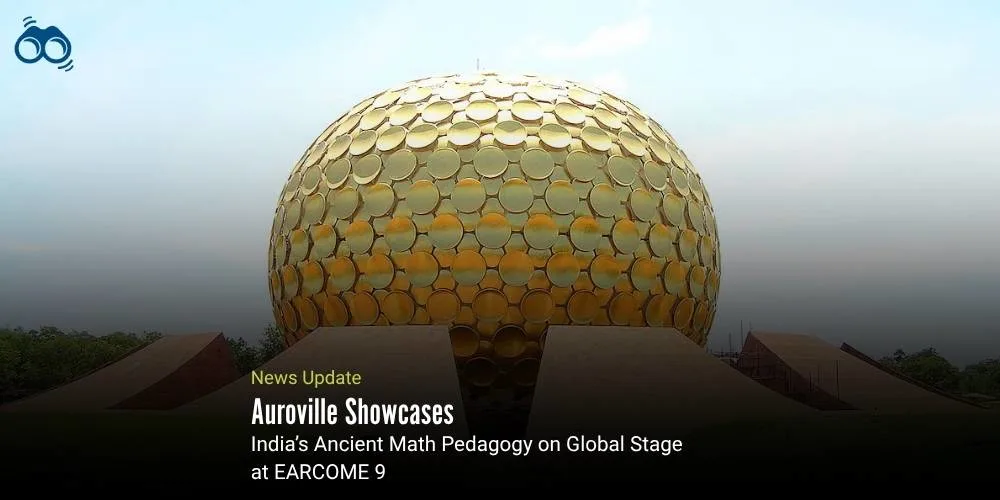Reviving Intuition: Indian Mathematics Gains Global Recognition
Auroville Researchers Present Traditional Maths Model on Global Stage
India’s mathematical tradition spans over three millennia, with profound contributions that have shaped global understanding of arithmetic, geometry, algebra, and trigonometry. From the Sulba Sutras of the Vedic period to the seminal works of Aryabhata, Brahmagupta, and Bhaskara II, traditional Indian mathematics is distinguished by its intellectual rigour, practical relevance, and pedagogical clarity. Its emphasis on intuitive reasoning, verse-based memorisation, and real-world application continues to offer valuable insights for contemporary education.
In a significant development for this legacy, a research team from Auroville is presenting a paper on traditional Indian mathematics pedagogy at the 9th East Asia Regional Conference on Mathematics Education (EARCOME 9), held in Seoul, South Korea, from 18 to 22 July. This marks India’s first participation in the regional conference, signalling growing international recognition of its time-honoured mathematical frameworks.
The paper, co-authored by Dr Sanjeev Ranganathan, Chair of the Sri Aurobindo International Institute of Educational Research (SAIIER), and Poovizhi, a mathematics teacher at Auroville School, explores how Indian Knowledge Systems influence teachers’ understanding and shape their interactions with students. According to Dr Ranganathan, many mathematical concepts taught today, such as trigonometric functions, have their origins in ancient Indian thought but were distorted over time due to cultural and linguistic transmission. He noted that the colonial era significantly altered the balance between informal and formal mathematics, often devaluing earlier indigenous contributions.
The research illustrates how concepts like “sine theta,” once rooted in tangible experiences such as the bending of a bow, became abstracted and disconnected from their intuitive origins. This shift, the study argues, has contributed to widespread math anxiety among students. In contrast, Auroville’s classroom experiments demonstrate that teaching mathematics through native languages and traditional methods fosters deeper engagement and understanding. The researchers advocate a return to contextual, experiential learning, grounded in India’s indigenous pedagogical traditions.
Jayanti S. Ravi, Additional Chief Secretary of Gujarat and Secretary of the Auroville Foundation, who has actively supported the research, emphasised that teaching mathematics within the Indian knowledge tradition represents not just a pedagogical choice but a distinct methodological approach. She referred to a “worldwide crisis in mathematics education,” noting that many students disengage from the subject midway through their schooling, resulting in a loss of potential STEM talent.
To address this challenge, Ms Ravi proposed scaling traditional educational models across India, potentially as a national movement, while also attracting global interest. The implementation strategy includes nationwide teacher training workshops, integration of traditional methods into mainstream curricula, and certification programmes in collaboration with international universities. India’s debut at EARCOME 9 marks a pivotal step in reclaiming and globalising its rich mathematical heritage.
Editor’s Note:
India’s participation in the 9th East Asia Regional Conference on Mathematics Education (EARCOME 9) is a major step in gaining global recognition for its ancient mathematical traditions. The research shared by Auroville’s team highlights India’s rich history in the subject and encourages educators worldwide to rethink how mathematics is taught. Traditional Indian mathematics, unlike today's abstract methods, emphasises clear thinking, verse-based learning, and real-life examples, which boosts student understanding and confidence. The Auroville study shows that using familiar language and cultural examples in teaching maths makes complex concepts like trigonometry, originally rooted in real-world experiences, accessible and engaging again. This teaching approach can globally impact science and technology skills. Making students comfortable and curious about math is crucial. Traditional Indian methods simplify understanding, deepen thinking, and improve problem-solving by connecting math to real life. The project involves teacher training, curriculum updates, and global collaborations, ensuring widespread use. As many countries see declining math interest, India's example could foster culturally relevant and relatable teaching worldwide.
Skoobuzz asserts that re-introducing traditional math teaching methods isn't about dwelling on the past. Instead, it's a strategic move to cultivate a more intelligent future by empowering students to become confident, creative thinkers who appreciate foundational knowledge and are prepared for novel challenges.














0 Comments (Please Login To Continue)